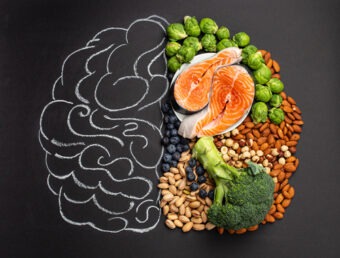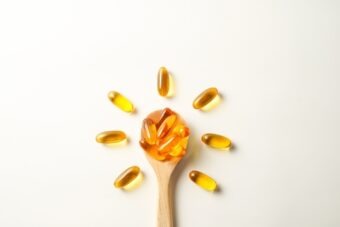Mental Health: The Nutrition Connection
Posted: October 28, 2024 | By: Shanon Peckham

With Movember ahead and World Mental Health Day not far behind, we wanted to take a moment to talk about the connection between nutrition and mental health. Read on to learn about how you can support your emotional well-being and overall health with supplemental nutrition!
You Are What You Eat
As the team here at Youngevity has always said, what you put in your body matters. One of the easiest ways to feel your best is to eat right! Nutrient-rich, whole foods will bolster your health and protect you, while highly processed, nutrient-poor foods can cause a lot of damage over the long term.1 Eating a diet higher in processed foods can make you more likely to die from any cause and gain more weight than those who eat healthier diets – which is not the way to live younger, longer.2
In addition to the long-term consequences, there are plenty of immediate downsides to poor nutrition as well. The high levels of salt, sugar, grease, and saturated fat in your favorite fast foods all combine to wreak havoc on your skin, organs, teeth, metabolism, and mental health.3 You’ll feel sluggish and grouchy,4 making you more likely to reach for the same damaging junk food again and again.5 This creates a vicious cycle of weight gain, low energy, bad mood, and poor health overall.
Only you can break the cycle! In addition to embracing a healthier diet (try our YFast recipes!) and lifestyle, these are some of the most beneficial nutrients to focus on when it comes to supporting your overall health and emotional well-being this winter:
Gut-Supporting Nutrients
Did you know your mental health mirrors your gut health, and vice versa? Your intestinal microbiome can affect how you feel, for better or worse.6 According to recent research, higher levels of inflammation and weaker gut barrier integrity are correlated with lower stress tolerance and certain psychiatric conditions (like depression and anxiety).7 To put it simply, an unhealthy gut = an unhealthy mental state.
This is why it’s super important to ensure your GI tract has the right nutrients it needs to thrive! Prebiotics and probiotics are a great place to start; they support healthy, smooth digestion, regulate your microbiome, and help guard against pathogens/bad bacteria. They can also help you neutralize toxins and better absorb beneficial nutrients like calcium.8,9 You can additionally nourish and grow a healthy microbiome with fermented foods and yogurt.10 Fiber, found mostly in vegetables, legumes, and leafy greens, will also be your digestive system’s friend. Next, follow up with digestive enzymes to help with digestion and nutrient absorption even more; these will be most beneficial for those with enzyme deficiencies or digestive woes (like bloating, acid reflux, etc).11
Omegas
Fun fact: Your brain is 60 percent fat!12,13 That’s right – the organ that processes your emotions and tells all your other organs what to do relies on these Essential Fatty Acids (EFAs) to function. Fats may have a bad rep, but they’re actually an important part of our diet.14 Certain fats like omega fatty acids – which have been demonstrated to support the heart, protect the brain, potentially reduce general inflammation levels, support various processes of your metabolism, and protect the skin’s natural barrier – aren’t generated by the body, so we have to rely on our food.15,16 While it’s true that too much fat, especially saturated fat, can be bad for you,14 you don’t want to skip out on this vital category of nutrients.
As much as 95 percent of Americans aren’t getting enough omega fatty acids;17,18 if you’re reading this, you might be one of them. Some of the side effects of an omega deficiency include obvious signs like rashes, hair fall, and joint pain, but they can also manifest as an increased risk of chronic diseases, depression, and other unpleasant reactions.15,19,20 One recent study also found a correlation between omega-3 and emotional outbursts; those who took omega supplements acted less aggressively or violently on average than those who didn’t, especially when the supplements were combined with therapy.21
To better support your body and mind for a healthier mental state, we recommend taking supplements like our Ultimate EFA Plus™ (fish oil) or Ultimate Multi-EFA™ (plant-derived oil) and upping the amount of fish you eat (or other vegan-friendly sources of omegas). Check out Dr. Wallach’s Good Food vs. Bad Food list for specific diet recommendations!
Adaptogens
Our fight-or-flight response is a vital survival mechanism, but when our everyday lives are filled with too much stress, our sympathetic nervous system can turn against us. You may notice during periods of greater stress, you’re more likely to get sick, have trouble sleeping, and feel groggy or depressed. That’s because your nervous system doesn’t get the opportunity to recover from that heightened state of stress, leading to chronic inflammation and damaging effects for many of your vital systems – including those that regulate your emotions.22,23,24
Adaptogens may be the best holistic way to directly address stress in your life, as they are particularly well suited to combat it. Where a prolonged state of fight or flight can sabotage your recovery from stress, these special herbs, fungi, and roots can help your body resist stress and restore your nervous system’s natural balance. In other words, adaptogens protect your body from the damage of stress and may even give you a mood boost.25,26,27 Many adaptogens, like mushrooms, also act as nootropics, boosting your energy levels, increasing your ability to focus, and supporting healthy memory function when you need it most.28
The list of amazing health benefits goes on, making adaptogens a must-have for daily health support. We added 10 unique mushroom extracts to our Tazza Di Vita™ instant coffee to help you start the day off right, even when you’re in a hurry! You can also try our SMART and SOUL Stiks™ for different kinds of nootropics.
Vitamins and Minerals
With only a small fraction of Americans meeting the CDC’s fruit and vegetable intake recommendations,29 it’s likely many of us are missing out on essential vitamins and minerals we can only get through our food. This can set us up for deficiencies, putting our physical and emotional health at risk. We’ll get into how modern farming practices make it even more challenging to get your nutrients from fresh produce in another article,30 but for right now, let’s talk about which ones are most important to supplement to protect mental health.
During the wintertime especially, it’s important to prioritize vitamin D. It keeps your bones strong, supports your heart, regulates your metabolism, and can help keep the seasonal blues away.31 While you can get this vitamin from the sun and foods like milk, eggs, and fatty fish,32 we recommend grabbing a Vitamin D3 supplement for maximum effectiveness.33 B vitamins are also high on the shopping list, as they are essential for a healthy nervous system and cognitive function.34,35 According to a recent study,36 “Vitamin B deficiency, especially vitamins B1, B6, B9 and B12, is associated with mood disorders that eventually cause stress or depression due to neurotransmitter disorders and increased homocysteine in the blood.”
Beyond vitamins, essential minerals can additionally bolster your mental health and help you avoid deficiency. Magnesium has been demonstrated to enhance the effectiveness of certain antidepressants, while a deficiency creates conditions ripe for depressive disorders.37,38 Zinc, Calcium, and Iron levels can also influence your emotions and the systems that regulate them, so it’s important to monitor your intake.39,40,41
Supplement Safety
At the end of the day, a full-spectrum multivitamin or mineral complex may be the best way to support your mental health with supplemental nutrition, but we always recommend checking in with your doctor and testing for potential deficiencies to start. Supplements can be life-changing, but they’re not for everyone. Make sure you always check the ingredients and follow the dose instructions when taking a supplement for the first time.
Read Next: Why Americans are Turning to Supplementation and Holistic Health
SOURCES
1 Nutritional psychiatry: Your brain on food, Harvard Health Publishing
3 The Effects of Fast Food on the Body, Healthline
4 The relationship between nutrition and fatigue, Sharp Health News
5 How Do Anger and Impulsivity Impact Fast-Food Consumption in Transitional Age Youth?, 2024
6 The Gut-Brain Connection, Cleveland Clinic
8 Health Effects and Sources of Prebiotic Dietary Fiber, 2018
9 Probiotics Fact Sheet, National Institutes of Health, Office of Dietary Supplements
10 Fermented Foods, Health and the Gut Microbiome, 2022
11 Digestive Enzymes and Digestive Enzyme Supplements, Johns Hopkins Medicine
12 Essential fatty acids and human brain, 2009
13 Effects of Omega-3 Polyunsaturated Fatty Acids on Brain Functions: A Systematic Review, 2022
14 Don’t Be Scared of Butter!, Youngevity Blog
15 Omega-3 Fatty Acids Fact Sheet, National Institutes of Health, Office of Dietary Supplements
16 Ultimate EFA Plus™, Youngevity.com
19 5 Signs and Symptoms of Omega-3 Deficiency, Healthline
20 Omega-3s, Mental Health America
22 Chronic Stress, Yale Medicine
23 Stress effects on the body, American Psychological Association
25 What are adaptogens and should you be taking them?, UCLA Health
28 What are nootropics?, Alcohol and Drug Foundation
30 How modern food can regain its nutrients, BBC
31 The Unexpected Benefits of Vitamin D, Youngevity Blog
32 Vitamin D Fact Sheet, National Institutes of Health, Office of Dietary Supplements
33 What’s the Deal with Vitamin D?, Columbia University Irving Medical Center, 2022
34 B Vitamins and the Brain: Mechanisms, Dose and Efficacy—A Review, 2016
35 Vitamin B12, Fact Sheet, National Institutes of Health, Office of Dietary Supplements
37 The Role and the Effect of Magnesium in Mental Disorders: A Systematic Review, 2020
38 Rapid recovery from major depression using magnesium treatment, 2006
40 The Role and the Effect of Magnesium in Mental Disorders: A Systematic Review, 2020
41 Iron and Mechanisms of Emotional Behavior, 2014
Posted in:





